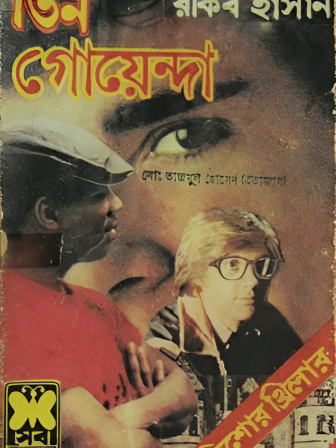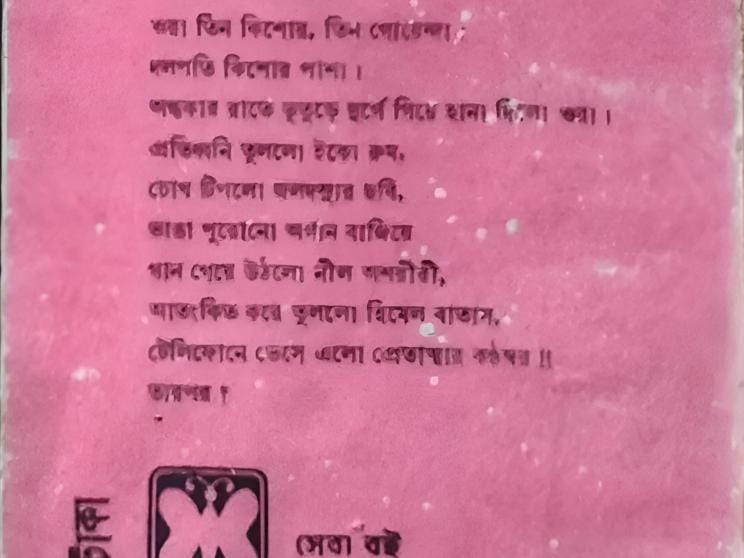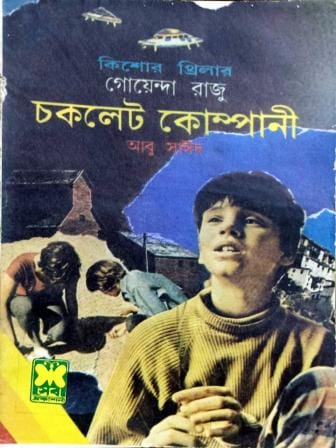The thrills of Rakib Hasan

For many of us who were still navigating our childhood days in the late '90s or early 2000s, long before Sherlock or Hercule Poirot entered our lives, there was Tin Goyenda – and the storyteller who made us believe we, too, could be a part of their team. In those pre-internet days, when power cuts stretched lazily into dusk and a mosquito coil burned in the corner, Rakib Hasan was the man who took us places. He gave us unknown trails to follow, cryptic notes to decipher, caves to explore, and friendships to treasure. For a generation of Bangladeshi readers, adventure didn't begin in the wild, rather it was in those yellowed pages, guided by his words.
Global adventures in a local lexicon
Rakib Hasan (1950–2025) began his literary career at Seba Prokashoni, where he first lent his pen to translation – adapting world classics into Bangla and bringing faraway adventures within reach of local, especially young readers. Before long, the translator became the creator. He began spinning worlds of his own, giving life to characters and stories that would ignite the imagination of an entire generation.

In his hands, the arid deserts of America or the vast Pacific Ocean transformed into familiar neighbourhood trails – places we could wander, explore, and investigate as if they were playgrounds just beyond our homes. Across a prolific career spanning decades, Hasan wrote more than 400 books. Yet it was Tin Goyenda that etched his name into the heart of Bangladeshi popular fiction – a creation that offered not merely an escape from the everyday, but an entry into wonder itself. Through his words, he taught a generation to dream, to question, and to believe that adventure was never far away; it was waiting quietly inside a paperback.

When Tin Goyenda first appeared in August 1985, few could have imagined that this modest paperback series would become a cultural landmark, spawning hundreds of sequels and shaping the imaginations of thousands across the country. Before Tin Goyenda, Bangla literature already had its share of iconic detectives and adventurers – Feluda, Byomkesh, Kakababu and many more – but they belonged, in a way, to the grown-ups. Rakib Hasan created a space for the young and curious, who wanted to see themselves as clever, brave, and just a little reckless.
His three heroes – Kishore, Musa, and Robin – were not superheroes; they were boys who made mistakes, argued, got scared, but never stopped thinking. They showed us that courage wasn't about strength; it was about curiosity.
The stories in his books usually unfolded in fictional towns far from the reality of Bangladesh, yet they never felt distant. All the characters might not have been Bangladeshi, but their spirit, loyalty, humour, and sense of justice felt unmistakably ours. Rakib Hasan took Western adventure tales and breathed into them a Bangladeshi heart.

His words collapsed distances. We didn't need visas or airplanes, only our imagination. And in doing so, he gave the young readers something greater: a global horizon. Long before smartphones, the outside world once felt impossibly far away, especially for children growing up in Bangladesh at that time. But his stories whispered otherwise – they told us that we, too, could belong to the larger world, where adventure, intelligence, and friendship knew no borders.
The cultural legacy
Over time, Tin Goyenda became a cultural code for a generation. Phrases like "Rocky Beach" or "Pasha Salvage Yard," evoke not just stories, but the pulse of youthful adventure. The series paved the way for other Seba classics and countless mystery offshoots. Even today, in the age of digital distractions, Tin Goyenda continues to find new readers. The old paperbacks, with their bold colours and dramatic covers, have become collector's items. Online forums buzz with fans sharing scans, memories, and debates about the best cases. There are even attempts to adapt the stories into films and web series.
But the true measure of his influence lies not in adaptations or merchandise, it's in how Tin Goyenda shaped a generation's sense of morality. It made honesty, curiosity, and teamwork seem heroic. In a time before moral education became a school subject, Rakib Hasan was already teaching us values through the thrill of adventure.

Beyond "Tin Goyenda"
While Tin Goyenda became Rakib Hasan's most celebrated creation, it was far from his only contribution to Bangladeshi popular fiction. His imagination spilled far beyond Rocky Beach. Through Seba Prokashoni, he introduced young readers to a sprawling universe of thrill, danger, and discovery – stories that stretched from the jungles of Africa to the backstreets of Dhaka.
His first book published under his own name was a translated work – Bram Stoker's Dracula. After that, he went on to translate many classic books by renowned authors such as Erich von Däniken, Farley Mowat, and Gerald Durrell. His Tarzan series, adapted from Edgar Rice Burroughs' classics, brought to Bangladeshi readers the wild jungles and untamed spirit of the legendary hero. He also translated the timeless classic Arabian Nights.

There were also characters of his own creation, Detective Raju and Reza-Suja, two homegrown series that carried the familiar pulse of Tin Goyenda but rooted closer to South Asian soil. Detective Raju blended mystery with street-smart intuition, while Reza-Suja followed two spirited young men navigating adventures that often mixed humour with suspense. In every story, one could sense his signature pulse – thrilling, witty, and charged with an underlying belief that curiosity was a virtue.

Rakib Hasan was also the assistant editor of the children's mystery magazine Rahasya Patrika, a monthly publication from Seba Prokashoni that became a sensation in its own right. Each issue arrived like an event, a small bundle of short stories, serialised adventures, and reader letters that made young fans feel part of a community.
For many, Rakib Hasan's books were their first introduction to detective fiction – a stepping stone that would later lead them to Doyle, Christie, and beyond. Through his works, he built an entire ecosystem of popular literature that spoke directly to Bangladeshi youth. He democratised reading – bringing thrill, imagination, and adventure fictions to an audience that had long been left out of literary sophistication.
Why his writing endures
What made his writing so timeless? Perhaps it was his instinct for balance. He knew how to mix tension with tenderness, intellect with innocence. His mysteries were never cruel or cynical; even at their darkest, they carried hope. There was also humour, Musa's fear of ghosts, Constable Fogramperkt's wry remarks, or Shutki Terry's mischievous schemes – all of these kept the adventures relatable and engaging.
In retrospect, it's astonishing how much we learned without realising it. The books taught us how to face uncertainty with curiosity. Each mystery began with confusion, sometimes even danger, but the message was always clear: there is always a way forward if you keep asking the right questions.


It's no surprise that many who grew up reading his books later became journalists, engineers, scientists, or writers themselves. For a generation that didn't have YouTube or Google at their fingertips, his stories were a crash course in critical thinking and courage. He trained our imaginations before we even knew we had them.
A wordsmith who stayed invisible
Ironically, for someone who gave us such vivid heroes, Rakib Hasan himself remained elusive. He never appeared in the limelight. To most readers, his name was simply printed in small type under the title. Yet, for those who loved books, that name carried weight. It meant that whatever lay inside was worth reading.
He made storytelling accessible and built a culture of readership. His prose was crisp, his pace cinematic, his dialogue natural. For many, Tin Goyenda was the first series that turned them into lifelong readers. It was the bridge between comic books and literature, between childhood fantasy and the larger world of ideas. And that, perhaps, is Rakib Hasan's greatest legacy – not the hundreds of mysteries solved or books written, but the millions of readers he created and inspired.

Farewell, but not goodbye
Rakib Hasan may have left this world, but his creations remain alive in countless hearts and bookshelves. Every time someone opens a dog-eared copy of Tin Goyenda and reads the first line, a new adventure begins. Somewhere, Kishore, Musa, and Robin are setting off again – solving mysteries, and reminding us that adventure and curiosity never go out of style.
In the broader landscape of Bangla literature, his work occupies a unique space, bridging the gap between children's stories and adult fiction, between translation and creation, between East and West. It's easy to dismiss pulp fiction as shallow or unserious, but the emotional mark left by Tin Goyenda and its kind is anything but trivial.
For those of us who grew up with his words, his works evoke more than nostalgia; they carry a quiet sense of gratitude. Rakib Hasan gave us the courage to let our imaginations wander, to follow the winding trains of thought inside our head even if we're restricted within the four walls. And in a world that often feels chaotic and noisier than ever, that gift still matters.
Miftahul Jannat is a journalist at The Daily Star. She can be reached at: miftahul@thedailystar.net
Send your articles for Slow Reads to slowreads@thedailystar.net. Check out our submission guidelines for details.




 For all latest news, follow The Daily Star's Google News channel.
For all latest news, follow The Daily Star's Google News channel.
Comments